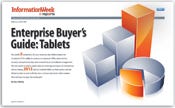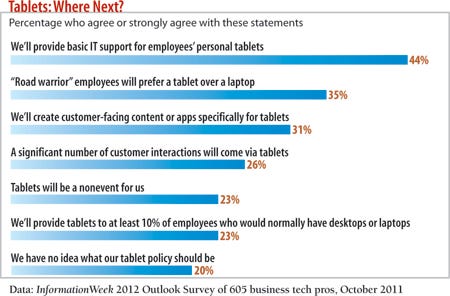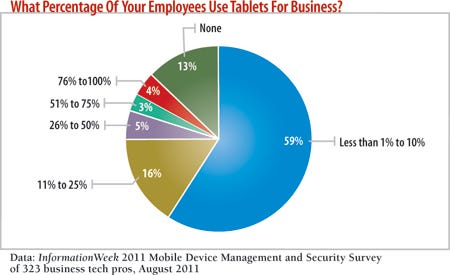Tablets In Business: Hard Lessons From Early Adopters
From garbage trucks to cruise ships, companies are putting iPads and Android tablets to work. Here's what they're learning.

A garbage truck is an unlikely place to see a slick Samsung tablet.
Four months ago, Waste Management outfitted about 20 of its trucks with the 7-inch touch-screen devices, which it loaded with software for route and pickup instructions that it had rewritten to work with tablets. The company was testing whether it could save money and improve performance with off-the-shelf consumer tablets rather than having to use industry-specific, ruggedized devices to replace its paper-based routing process.
Then, the night before the pilot test went live, Waste Management's telecom carrier sent an update to the tablet's Gingerbread Android operating system. The change meant the on-board charging system no longer worked with the tablets, so they would run out of power while crews were on the road.
Having rallied from that setback, Waste Management now has high hopes for the project and will decide later this year whether to use tablets in its 20,000-some trucks.
Waste Management's experience is just one example of the hard lessons companies are learning as they take consumer-oriented iPad and Android tablets and put them to work in ways their makers never planned. Tablets are showing up in warehouses, hospitals, cockpits, and boardrooms. They're making sales calls and even being tested on the battlefield. The simple-headed response to the "consumerization of IT" trend is that companies embracing easy-to-use gadgets and software will make IT organizations irrelevant. But early experiences with tablets show that it still takes creative IT work to make these tools do what companies need them to do. Here's what pioneering companies are learning.
People Need Content
Salespeople are often the first to get company-issued tablets, for a few reasons: They're mobile, they're showing stuff to customers, and they need instant-on access.
But giving tablets with just email to salespeople is no better than giving them smartphones. At the very least, they're going to want to create presentations and show their customers product demos and videos on their tablets, and IT will need to help them.
Holly Hunt, a high-end furnishing company, tested iPads with its salespeople who pitch to big architecture and design firms. "We discovered we didn't have the right assets for them," says Neil Goodrich, director of business analytics and technology. Holly Hunt had lots of beautiful photographs of its designs, but the images weren't easy to render on a tablet--people had to build a PowerPoint with their laptops, and the viewing app wasn't ideal. So the company's IT department is building an app that optimizes presentations for tablet viewing, though salespeople still need to create presentations on their laptops.
Learn more about the way businesses use tablets. View the slideshow on 9 Powerful Business Uses For Tablet Computers. ]
Telecom provider Level 3 went further with its iPad rollout to 1,300 salespeople. It built an app that lets them create presentations entirely on their iPads, pulling in standardized content like company and product descriptions, then customizing their presentations with content unique to the would-be customer. IT also built for the device a native app that lets salespeople pull together data from various sources, including CRM data from Salesforce.com and from on-premises systems, and generate price quotes.
Blast Radius, a digital marketing firm that's done cutting-edge work with the likes of Starbucks and Nike, has built an app for a perfume maker to help its sales agents in department stores guide shoppers to a fragrance that's right for them. Now Blast Radius is trying something new during its own sales presentations: Instead of standing up and showing prospective clients PowerPoint slides, it's going to hand them iPads with presentations on them.
Face it, says Gautam Lohia, Blast Radius's executive VP for emerging tech, people are going to have smartphones in front of them while you're talking. "Instead of being distracted by their smartphones, your smartphone and email, you're distracted with our cutesy app," he says. (That iPad isn't a gift, by the way. Blast Radius will need those back.)
The key point is that content for the tablet needs to be purpose-built--for your company, the employee's specific requirement, and the tablet form.
Enterprise Buyer's Guide: Tablets
Rebooting the Tablet Market in 2012 Our buyer's guide for enterprise tablets is free with registration.
Our buyer's guide for enterprise tablets is free with registration.
The tablet market has been the iPad market, but innovation by Google and manufacturers is making Android an enterprise option. Our report includes:
Analysis of six tablets with a focus on enterprise readiness
Predictions of new tech likely to be added to tablets this year
"The iPad is an incredibly personal device," says Bill Martin, CIO of Royal Caribbean, which is taking a leap by putting an iPad in every stateroom of its newly renovated Splendour of the Seas cruise ship, so that guests can use them to access ship information or just the Internet. (More on that later.)
But when it comes to equipping Royal Caribbean staff, Martin's not buying tablets. He doesn't think they replace laptops. And since people want so much personal content on their work devices--apps, books, movies--he's taking a BYOD (bring-your-own-device) approach, letting employees get corporate email and calendars on their personal tablets.
Nick Taylor, senior VP of technology at Level 3, thinks salespeople might not need their laptops, but he let them keep the devices when Level 3 rolled out tablets to them last month. First, having a laptop was a safety valve if the tablets didn't work. Second, in the spirit of user-driven IT, Taylor wanted to let the company's salespeople have both and see what they chose to do on them.
One important exception is executives, some of whom are finding they can travel with just a tablet and leave the laptop at the office. When they're on the road, they tend to consume and monitor information and quickly reply with fairly short emails."The owner, Holly, has an iPad, and this is the device she's been waiting for all her life," says Goodrich, referring to Holly Hunt, the company's founder, namesake, and CEO.
Another growing use for tablets is with corporate board members. The old drill was to FedEx a 600-page book to each director with all the confidential data needed for a board meeting. BoardVantage was founded in 2003 to offer an alternative via a PC-based Web portal, but that business sputtered along. Board members "aren't exactly millennials," says BoardVantage CEO Joe Ruck, and the company's portal wasn't as easy to read and make notes on as paper books. After launching an iPad version in mid- 2011, BoardVantage has signed up hundreds of new companies a quarter, compared with less than 20 per quarter it got with the PC version. BoardVantage has found that would-be customers' IT groups were "a bit of a laggard" on pushing the iPad approach, Ruck says. "It was the directors who really pushed ahead on this."
Replace Other Kinds Of Hardware
Instead of replacing a lot of laptops, look for tablets to replace industry-specific computing devices, like point-of-sale terminals, says Lars Kamp, strategy leader for Accenture's mobility group. A cash register costs $3,000 to $5,000 and needs a five-year life cycle to justify the cost. What if instead that interface was a $500 tablet, which your young workforce can learn to use more quickly? "You can throw the tablet away every year, and you have the latest computing experience," Kamp says. And as CIOs embrace this consumer product cycle, they will move away from three- to five-year innovation cycles to one- to two-year cycles, Kamp says.
Waste Management IT director Matthew Childress is weighing that very idea, though he isn't sure yet about the right life cycle. Waste Management is testing both a consumer tablet and a more conventional, ruggedized Windows-based tablet to replace paper forms most drivers use today to get route information. All things being equal, the company would like to use the same device in all of its trucks for three to five years, but Samsung and most other consumer tablet vendors won't produce a specific tablet for that long--their product cycles are more like 18 months. Motorola Solutions says its upcoming ET1, an enterprise Android tablet, will have at least a three-year life cycle--but also a price tag of about $1,000.
Childress thinks the price of consumer tablets could go as low as $200, which could make their shorter life cycles pay off. The big upside is that tablets would let Waste Management stay up to date on features, such as advanced voice recognition that might eliminate the need for radios or telematics-based vehicle monitoring. The new models, however, would have to fit the same cradle in the truck to make economic sense, he says.
For Royal Caribbean, tablets are taking the place of interactive TVs. On its two newest ships, launched in 2010, interactive TVs with a keyboard provide guests with information, including personalized promotions that factor in guests' past purchases with real-time data on which spas and restaurants aren't booking up. With its latest Splendour of the Seas ship upgrade, and those going forward, however, Royal Caribbean will provide that information on iPads, a more intuitive interface, and just put in regular TVs.

Consumer = You're Not In Control
Waste Management's experience with tablet operating system updates taught it that using consumer tablets means it won't get the kind of advanced warning about code updates and new features that it's used to getting with enterprise software. In addition to the charging snafu, its Android tablet providers have sent OS updates that broke the custom code that it wrote for those devices, sending Waste Management scrambling to revise the code.
For companies using or considering iPads, Apple's singular focus on the consumer experience means businesses won't get everything they want.
For example, Royal Caribbean would like to turn off the iPad camera entirely, because it doesn't want pictures one guest took to remain on the device when the next guest arrives. But Apple doesn't allow for the camera to be easily disabled, so Royal Caribbean's IT team had to create a workaround that lets it erase the camera file remotely. Martin considers it a far-from-elegant fix.
Global electronics distributor Avnet began testing iPads in one of its warehouses in November, and it did "surgery" to them to make them fit the job, says Sean Valcamp, Avnet's director of IT architecture. Avnet disabled iTunes so its people couldn't download apps to it. It also disabled Bluetooth and other unneeded features to prolong battery life. To Valcamp's surprise, warehouse workers are now getting as much as three days of iPad use without a recharge, since the tablet's doing nothing but running the apps they need.
Companies using native iPad apps also have had to adjust to life with the Apple App Store. BoardVantage would like to tell its customers exactly when it's making a new version or feature of its board meeting app live, but it can take a week to 10 days for Apple to approve an app change. The upside to the App Store, Ruck says, is that once its app is approved, customers can easily update using iTunes.
Native Vs. Web Apps: It Depends
Avnet is testing the iPad for use in confined areas where small products are stored and it's hard to place a terminal. Previously, a worker would stand at a terminal and yell out serial numbers of products he's picking from those areas. With the iPad, he can type data in, or he can scan an item using the camera and an app that recognizes bar codes.
Avnet built the functionality as an HTML5-based Web app, which uses the iPad's Safari browser. Valcamp thinks Web apps are the way to go because they're an extension of Avnet's service-oriented architecture. "It's another cog in the wheel," he says.
But other companies are building native applications. Taylor describes Level 3's app as more of a mashup, since it uses a services approach to draw on data from other internal systems.
The appeal of a Web app is that companies can write it once and it should work on any tablet with a browser. It's true that one Web app is easier to support than native apps for the iPad and various Android devices, says Accenture's Kamp, but this conventional wisdom doesn't hold entirely true because of variations in browsers. Native apps are generally snappier, and there are some things you can't do well with a Web app, like take full advantage of device features like the camera or GPS, or the tablet's graphics capability.
Most companies will do a hybrid, Kamp predicts, where the native app's lightweight code gets data from a Web app and its look is optimized for that particular iPad or Android tablet. That simplified approach lowers development costs. And companies can change the data an app user gets without going through the Apple approval process, since the native code stays the same and the changes happen on the back end.
Another approach companies are using to get content onto tablets is a virtual desktop, often Citrix Receiver. A note of caution with this tactic: Set expectations carefully, since the experience can vary greatly from app to app.
St. Joseph Healthcare figured that out as it used Citrix to let doctors access their clinical records software. Doctors didn't ask IT if they could use iPads. They just started using them by putting remote desktop access software like GoToMyPC on the tablet so it could show the medical records back on their office PC. To get better control of that, IT offered the Citrix option. As it rolled it out, IT let doctors know which software would be a good experience on Citrix and which wouldn't. It warned that radiology images, for example, wouldn't be of diagnostic quality. Now St. Joseph's medical records provider is offering a Web-based tablet app, and IT is testing that now.
Tapping Developer Expertise
Hiring a fleet of iOS developers isn't the way for most companies to launch a tablet initiative, since the combo of mobile development and enterprise IT expertise is so rare. Instead, Waste Management took Java developers, many with minimal mobile skills, and molded them into its Android team. Most top-notch IT pros like learning the hot skills and see the career opportunity. Childress has seen it energize the Waste Management team.
For its iPad effort, Level 3 did a mix of hiring and retraining. Avnet used in-house people, as it already has about 20 mobile apps. Some companies rely entirely on contractors.
But be careful with contractors. Just because development shops have first-rate design skills doesn't mean they can do the integration or security work businesses need, or understand the scale of enterprise apps.
"It's kind of the Wild, Wild West out there, particularly when it comes to enterprise," Royal Caribbean's Martin says. The company the cruise operator used for its iPad app is Four Winds Interactive, the same company that created the poster-sized interactive digital signs for its ships in 2010. Some rivals had more iPad experience, but Four Winds knows Royal Caribbean's business. "The iPad is just a digital sign" with a lot more capability, Martin says.
Security And Management
Security's always a concern. But many companies are finding that off-the-shelf mobile device management software--from the same vendors they use for managing iPhones, companies such as Good Technology, AirWatch, and BoxTone--are up to the task. Their MDM software allows for remote wipe of lost tablets, remote updates, and policy settings based on people's roles. At Holly Hunt, for example, most warehouse workers have a locked-down setting that lets their iPads access only specific apps, but certain warehouse team leaders get Internet access. None can download apps.
Avnet isn't using any MDM software for its warehouse tablets, as it has disabled certain apps and features with its "surgery." Workers check its iPads in and out with a paper sign-in sheet.
Valcamp warns against making things too complicated in the tablet pilot stage. If Avnet expands from its eight-iPad test to 25, and then to many more warehouses, it might make sense to automate that checkout process. But before Avnet adds any bells and whistles, it must first be satisfied that tablets make warehouse teams more efficient.
MDM is a market up for grabs at this point. While there are a number of established players, no one comes close to dominating. And the features each vendor offers are changing quickly, so it's not something that IT can put in place and forget about.

Don't Forget The Camera
At Holly Hunt, Goodrich took a few iPads to the warehouse and asked people to experiment. They immediately started using the camera. Holly Hunt warehouse staff have to make judgments about whether to accept incoming goods--is this bolt of $150-a-yard silk damaged? They started taking quick iPad videos with a voice-over and sending it to the buyer, who could decide whether to accept the order. "That's a very expensive decision," Goodrich says.
In Holly Hunt's prototype workshop in Chicago, people started creating videos and doing Web chat with colleagues at the company's factory in Texas, discussing the feasibility of product ideas.
Tablets are underrated for their video capability, but that won't last long as people stream movies via Netflix to their tablets.
"It will unleash a video monster like we haven't seen before," predicts Scott Snyder, president of professional services firm Mobiquity. He says video chat will skyrocket, as it's easier and more natural to use Skype, FaceTime, or a similar desktop-type chat than it has been on a PC.
Apple Still Knows Best
Steve Jobs' contempt for business IT was well known. But Apple is far from anti-business, and companies are engaging directly with the vendor to talk about their iPad strategies and solve problems. In Apple's fourth quarter, it sold 11.1 million iPads, and the first examples CEO Tim Cook cited during his remarks about iPads were business examples. Fifty-two percent of Global 500 companies are testing or deploying the Apple tablets, Cook said.

Teradata CEO Mike Koehler
Rooms with more than a viewHowever, the burden still remains on businesses to adapt to Apple's products. "They're certainly open to the discussion," Royal Caribbean's Martin says. "It hasn't been easy to get them to take quick and decisive action."
Apple loves to highlight sophisticated medical images in its TV ads. But when St. Joseph tried to find out how best to clean iPads for use in clinical settings, Apple didn't have an answer for it. So far, the disinfectant it's using hasn't caused damage.
Apple also doesn't provide an iPad product road map the way enterprise IT vendors usually do, making it harder for CIOs to plan their long-term strategies. But that doesn't seem to worry IT leaders much.
Martin knows Apple will introduce an iPad 3 fairly soon--and it could come the day after Royal Caribbean puts iPad 2s on its ships. Martin's OK with that. He expects an iPad to last about three years on one of its ships, and he's confident that any version will be supported and sufficiently cool over that time. Royal Caribbean still uses first-version iPads it put in a few restaurants as menus in 2010, and they're still a hit, he says.
An IT executive might want any number of things from Apple to make it more enterprise-friendly, but "then they'd be Microsoft, not Apple," says Level 3's Taylor. He doesn't fret about the lack of a long-term road map; he just wants Apple to stay focused on the consumer and providing a killer user experience. "I just think it's a different thing," Taylor says.
Android developer Google isn't necessarily more in tune to business needs than Apple is. But because Android is an open source operating system, tablet makers who adopt it have the freedom to make changes. "That's where Android, with its malleability and range of OEM providers, is going to thrive," says Mobiquity's Snyder.
Waste Management uses the Gingerbread version of Android and is looking to move to Honeycomb. It hasn't worked directly with Google to address any OS questions, going instead to Samsung and other tablet manufacturers, which understand integration and firmware issues. Waste Management never seriously considered using the iPad. The biggest reason: It's too big for truck cabs.
Windows 8 Tablets: Intriguing
Because iPads still have the cool factor, they're often the default choice if you're rolling them out to consumers, as Royal Caribbean has. The cool factor doesn't stop there. "We're in the fashion industry," Holly Hunt's Goodrich explains, "and iPads are what's cool. It wasn't a discussion."
But companies are waiting to see what Microsoft can do with tablets, as they have loads of Microsoft technology talent and a huge investment in Microsoft desktop software. Windows 8 promises substantial interface improvements.
Capgemini's Fernando Alvarez would welcome a Windows 8 tablet option and is encouraged by the early signs of success for the Windows Phone OS on Nokia devices. "It's a pleasant surprise, because we need Microsoft in the game," he says. It'll bring more competition and address some of the enterprise needs Apple and Google haven't. Alvarez is waiting to learn more about Microsoft's plans, but he sees that execs are "expecting that this will get me closer to the dream where I don't need a laptop," he says.
Help People Experiment
IT organizations have a lot to prove with tablets. They were late to the smartphone revolution--employees were using iPhones for work long before BYOD entered the IT lexicon. While IT was highly skeptical of tablets when they arrived, business technology leaders are now helping employees experiment with them.
"We've laid the foundation," says Goodrich, referring to Holly Hunt's use of MDM software and experience using iPads in the warehouse and sales. "We're prepared to say yes rather than no as these business units approach us."
At Waste Management, testing tablets in the trucks opens up new discussions about how to improve driver efficiency. "We have a chance to build a bridge to the fleet groups and maintenance," Childress says, by bringing other people into the project management.
But a lot of ideas for tablets won't work. "I have seen every kind of crazy idea of trying to put the iPad where it doesn't fit," says Capgemini's Alvarez, describing people as "enchanted" with the Apple tablets.
Avnet has set up Think Tank, an online idea platform where employees worldwide can propose, discuss, and vote on ideas. The "app for that" consumer mentality is coming to enterprise, Valcamp says, so development will focus on industry-specific apps. "As we push BYOD, we're going to see more ideas about how to use tablets and mobile devices," he says.
Remember how the doctors at St. Joseph hospital just started using tablets without asking IT's permission? Instead of trying to crack down, IT watched. They observed what doctors were doing, asked what else they wanted, then made it IT's problem to figure out how to do that in the most scalable and secure way. Jeff Allport, VP of IT solutions and operations, took rogue IT as a living requirements document; if physicians made the effort to set up homegrown remote desktop systems to get them iPad access, "they were telling us that they really wanted to try these devices in a clinical setting," Allport says.
Mobile innovation will test IT's ability to work at a faster pace, as new devices come out more frequently than they did in the PC-centric world. It will test relationships with business units and employees, as they choose to seek out or avoid IT as they try new technology. The iPad and other tablets are only one of the forces driving this change. But what a force.

InformationWeek: Feb. 13, 2012 Issue
Download a free PDF of InformationWeek magazine
(registration required)
About the Author(s)
You May Also Like







